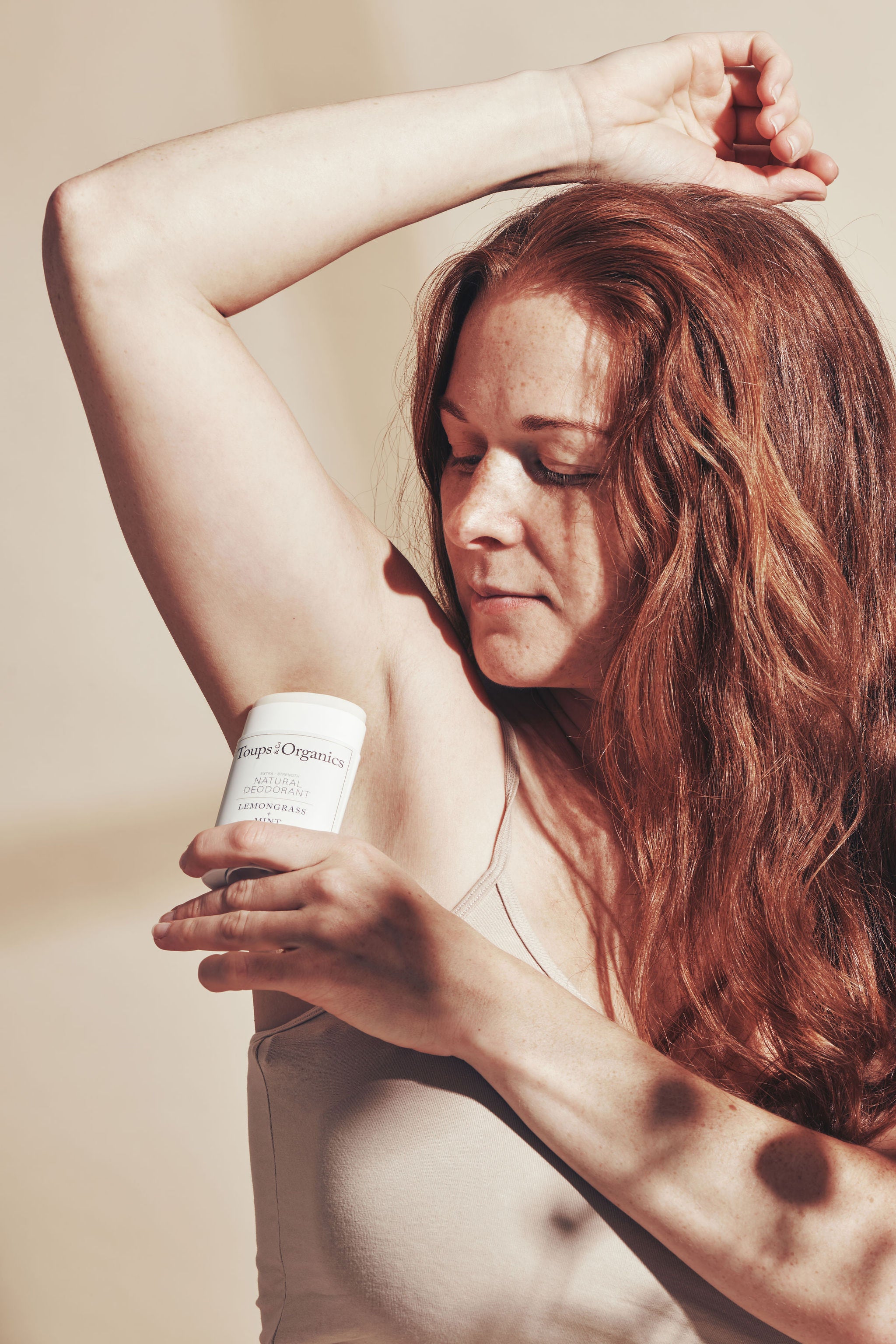If you Google something like “Does deodorant cause breast cancer?” you’re likely to find several conflicting results.
Aluminum deodorant has absolutely nothing to do with breast cancer.
The studies are inconclusive.
Actually, a recent study showed that aluminum salts altered cell structure within twenty-four hours.
Deodorant and breast cancer is a long-debated subject. And (spoiler alert) one that is clouded by an industry that’s worth 24 billion dollars.
Since our own aluminum-free deodorant products aren’t approved by the FDA, there’s only so much we can say about the link between deodorant and breast cancer.
Many years ago, we lived our lives just like everybody else: regularly swiping drugstore deodorants under our armpits, without a second thought.
What changed for us?
It wasn’t the studies. It wasn’t some in-your-face proof that we couldn’t deny.
What changed our minds was broadening our understanding of the human body.
It was researching the toxic chemicals in everyday hygiene products—and seeing tangible changes when we stopped using them.
And it was trusting the intuition of our ancestors, who understood how to heal and be well before modern medicine.
So no, we’re not going to tell you that aluminum deodorant definitely causes breast cancer. But we are going to share the science and principles that convinced our family to switch over to aluminum-free deodorant for good.
Does Topical Deodorant Absorb into Your Skin?
When exploring the potential toxicity of deodorant, this is an important question to ask. Logically, if deodorant can’t absorb into your skin, then it shouldn’t cause any physical harm.
The skin is our body’s largest organ. One of its jobs is to act as a barrier by keeping toxins out of sensitive areas. It shields our internal organs from environmental harm.
But the skin does absorb things, too. It can absorb minerals (magnesium, for example) to help our bodies, and it can absorb things that harm our bodies (like chemicals).
One study that looked at the chemicals in our tap water showed that an average of 64% of those chemicals are absorbed into our bodies. Since each chemical compound is different, our bodies can absorb different chemicals at different rates. So, it could be debated that some chemicals are less harmful … but is it really worth the risk?
Our philosophy is, don’t put things on your skin that you don’t want in your body.
Is Aluminum in Deodorant Bad for You?
Aluminum in deodorant is optional. It’s not included in every formula, so it’s important to check the label of your deodorant brand to see exactly what’s in yours. Aluminum is typically used to stop sweat production—so you can go about your life without the embarrassment of stress sweat or a soaked t-shirt at the gym. Sounds good, right?
Like any time you disrupt a natural bodily function, there are consequences.
Sweating is incredibly good for your skin—it produces a peptide that’s naturally antimicrobial, targeting bad bacteria that could cause skin issues and breakouts. Sweat is also a detox pathway your body can use to rid itself of harmful toxins. One study showed that a variety of heavy metals were excreted through sweat—and different heavy metals were excreted during different activities.
Finally, aluminum itself simply isn’t good for you. It’s a heavy metal and is known as a neurotoxin. Sure, you’re only using small doses every day, but those doses add up.
Should You Worry about Other Chemicals in Deodorant?
Since aluminum is considered a heavy metal, most people who are concerned about the consequences of conventional deodorant point fingers there first. And it’s true, aluminum is dangerous.
But there are a lot of other concerning ingredients in deodorant, too. Watch out for things like:
- Parabens
- Volatile Organic Compounds (VOCs)
- Phthalates (known hormone disruptors)
- Alcohol
- Fragrance (a cocktail of undisclosed chemicals)
- Triclosan (an antibacterial)
- Talc
- Propylene glycol
Not only have we learned that chemicals can absorb into the skin, but the presence of Volatile Organic Compounds (VOCs) in deodorant should caution us against using them, since VOCs are chemicals we breathe in.
Aluminum Deodorant and the Lymphatic System
The lymphatic system is a drainage pathway that our bodies use to remove toxins (it cleans almost every cell in the body). Although it’s not the most well-known system in the body, it does extremely important work. Without the lymphatic system, we’d all be a swollen, puffy, and toxic mess.
There are key areas of the body where your lymphatic system may drain—including the armpits. The armpit is home to a system of lymph nodes called the axillary lymph nodes. Interestingly, breast cancer often starts in the armpit or eventually spreads to axillary lymph nodes.
There is growing concern that chemicals in our deodorant and other skincare products can absorb into the lymphatic system itself. If this is true, it means that aluminum and parabens are quite literally circulating through your entire body—and may contribute to a blocked and sluggish lymphatic system over time.
Our Take on Aluminum-Free Deodorant
Using aluminum-free deodorant is a scary step in your nontoxic health journey. It was for us, too. After reading all the research, studying the lymphatic system, learning about the detox pathway of sweat, and understanding exactly how harmful aluminum can be for the body, we decided to choose aluminum-free deodorant. And we’re so glad we did.
Here are a few core reasons why we’ll never turn back:
Safe Hygiene Is Always Better
Even if we can’t prove that conventional deodorant is bad for you, we don’t want to take any chances. Aluminum-free deodorant works great for us, and we feel so much better after going through the detox phase ourselves.
We Shouldn’t Disrupt the Body’s Natural Functions
Our ancestors knew that disrupting the body’s natural functions was a bad idea. But over time, we’ve lost the knowledge of our ancestors and become vulnerable to industrial products and ideas. Sometimes you just have to let the body do its thing—and trust that it has a purpose.
Natural Deodorant Actually Works Great
We admit it … when natural deodorant first became popular in holistic communities, it left a lot to be desired. But formulas have changed over the years. We especially love our natural deodorant (yep, we’re biased). It helps control odor with magnesium, which can actually benefit your skin.
Does Toxic Deodorant Cause Breast Cancer? You Decide.
We can’t make medical claims, and honestly, we don’t want to. The beauty of natural skincare is that it gives the power back to you. No more clever marketing, no more hiding thousands of chemicals under a “fragrance” label, and no more greenwashing.
We believe everyone should do their own research to find the products that they feel are safest for their own families.

